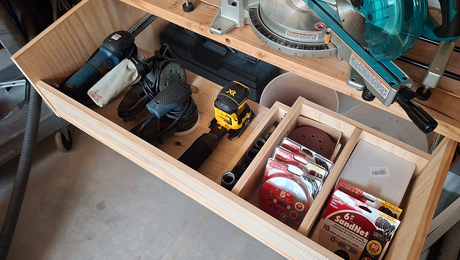I opened a wall while doing a reno and found a buried junction box. So, I decided to do some investigating and found some hinky electrical work that roams around in the walls without any apparent reason. I want to fix the problem, but I don’t want to rip all my walls out looking for wires that seem to have been run by a madman. Is there a tool that detects wiring behind walls so I can chart out my service?
Discussion Forum
Discussion Forum
Up Next
Video Shorts
Featured Story

Listeners write in about removing masonry chimneys and ask about blocked ridge vents, deal-breakers with fixer-uppers, and flashing ledgers that are spaced from the wall.
Featured Video
SawStop's Portable Tablesaw is Bigger and Better Than BeforeHighlights
"I have learned so much thanks to the searchable articles on the FHB website. I can confidently say that I expect to be a life-long subscriber." - M.K.
Fine Homebuilding Magazine
- Home Group
- Antique Trader
- Arts & Crafts Homes
- Bank Note Reporter
- Cabin Life
- Cuisine at Home
- Fine Gardening
- Fine Woodworking
- Green Building Advisor
- Garden Gate
- Horticulture
- Keep Craft Alive
- Log Home Living
- Military Trader/Vehicles
- Numismatic News
- Numismaster
- Old Cars Weekly
- Old House Journal
- Period Homes
- Popular Woodworking
- Script
- ShopNotes
- Sports Collectors Digest
- Threads
- Timber Home Living
- Traditional Building
- Woodsmith
- World Coin News
- Writer's Digest


















Replies
I used to work with a guy that could find electrical wires in a wall with a nail or screw no matter how well they were buried/protected.
He was pretty good at hitting, er finding, pipes as well.
I couldgive him a call if you're interested. ; )
Bump.
J. D. Reynolds
Home Improvements
There are, but I have not used enough of them to say that they will find them all.
The proximity dectors ($10-20 pocket sized tick testers) will detect energized circuits for couple of inches. Sometiem they will see behind the wall, sometimes not.
Some stud sensors have similar features in them. But, at least the basic ones, the range is limited and won't alwasy show them.
You can get tone tracers for about $80-100 dollars. They are designed to help ID phone and cable wwires. They have a little more range, but they will only work on unergized circuits and without ANY LOAD. Have a light bulb on the circuit circuit that is turned on a wall wart plugged in and it won't work. And even when it works the range is not enough to always trace it in the wall.
There are some more expensive units that work on energized circuits and can work with buried cables so I assume that they have the range. They run $350-750. I have not used one so I am not sure about the range and capabilities.
.
A-holes. Hey every group has to have one. And I have been elected to be the one. I should make that my tagline.
This Ideal Industries tracer is the best:
http://www.idealindustries.com/products/test_measurement/circuit_tracers_analyzers/suretest_circuit_tracers.jsp
It'll trace wires behind lath and plaster, sheetrock, 2-3 feet underground. It'll positively identify a circuit breaker, even on a multiwire (shared neutral) circuit. And it'll work on live or dead circuits.
Of course, it's expensive. If you're a contractor, it'd be worth it. Hard to tell, you've got no info in your profile.
Anyway, I don't own stock in Ideal. They just make stuff that works.
Cliff
I can relate to that. So far, I have found four hidden junction boxes in my kitchen.
Greenlee has a circuit tracer,
http://www.mygreenlee.com/Products/main.shtml?p_search=2007&greenlee_category_id=100&portalProcess_2=showGreenleeProductTemplate&upc_number=36924
Power Finder™ Closed Circuit Tracer cat number 2007
The regular retail price is around $400 US. Greenlee has two other models with different capabilities. I just picked up a used one on eBay for around $175 US including shipping. I just did some preliminary testing in my kitchen to see how it works. I have a partially open wall between my kitchen and family room. (gyproc on one side and open on the other) The device has "no" problems picking up the live electrical line through the gyproc at a distance of a couple feet. I can then reduce the "gain" dial to more precisely locate the line. The device also can tell the orientation of the wires. For example, in my case, the wire are running parallel to the studs. If I rotate the device 90 degrees, the signal detection is significantly reduced.
The device seems to have no trouble detecting signals through 7/8 inch granite on the back splash in my kitchen. Of coarse, I did not destroy the granite backsplash to confirm the live wires actually exist.
Only time will tell whether the circuit tracer does everything that I had purchased it for. Used Greenlee circuit tracers seem to be selling for (depending on the model) for the $200 to $300 US range on eBay. So, I am hoping to recover most of my cost once I finish with my project.
I am sure that the Ideal Suretest tracer would work just as well (if not better). Only problem for me was that the least expensive model at the local electrical supply store would have set me back around $1000 US. Considerably more than I had wanted to spend.